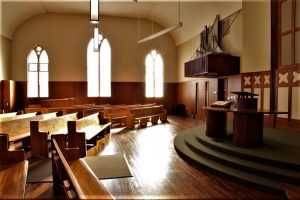
Years ago, when we moved from Ancaster village to our farm, we kept our membership at the same downtown Hamilton church – the only difference was that there were now morning chores and so we were pressed for time on Sunday mornings. Church services commenced at 9:30 am.
As my father drove down the escarpment roads enroute to worship, my mother would be vigilant for any threats to our safety from other traffic, (which mostly consisted of other innocent-looking church-going people). Although I’m pretty sure she’d never heard of Thomas Hobbes, she believed a similar philosophy to his: life could be “nasty, brutish and short.” But trouble was not going to happen on her watch, if she could help it.
Her other belief was in rigid self-inspection. That could be at least traced to John Calvin’s belief in self-knowledge as a first step on the path to salvation. We were her children, and so included in the scrutiny for any imperfections. Without warning, we could be swooped upon with a spit-dampened tissue to vigorously wipe off any face smudges.
First Christian Reformed Church was very full in those days. Parking was a problem, as the church did not have any, and so we sometimes hurried in from several blocks away. We would arrive in the nick of time, and therefore any remaining seating would be in the very shadow of the pulpit. Chairs had to be set up to accommodate the overflow. Needless to say, we literally looked up to ministers in those days.
So my view was pretty similar to the perspective in the photo above. As a child, bored with long sermons, I imagined the tall curved windows that presided over our services as three stern old men, Genevan giants who frowned at any fidgeting or impropriety. In the bitterly cold snowy winters, we braved the icy “mountain” roads and stomped our boots on the mats as we came in. On hot summer evenings, the skin on our legs melded to the wooden pews. Few things were deemed important enough to deter attendance, whether for morning or evening services.
There are many good memories: the majestic pipe organ music and the beautiful hymns sung whole-heartedly by the congregation, the large Sunday School classes and Christmas programs, our girls’ Calvinette club led by young women we admired. The Bible verses we memorized there are still in my heart today:
“What does the Lord require of us? To do justice, to love mercy, to walk humbly with our God.”
“Charm is deceitful and beauty is vain, but a woman who fears the Lord is to be praised.”
“If any man (no gender inclusion then!) is in Christ, he is a new creation: the old has gone, the new has come.”
As the church grew, daughter congregations left to form their own places of worship, but initially First Christian Reformed Church was a central meeting place that included people living many miles apart. It was this community that we primarily identified ourselves with, before any geographical or occupational categories. Even today, I find comfort in remembering its solidarity, or in recalling the special Sunday evenings we would get to go there with our father while the younger ones stayed home.
To a group of often struggling immigrants, meeting together gave an assurance that God was still sovereign over heaven and earth, so all would come together right with this new world, too. We could take heart, and begin a new week comforted by this hope and confidence.
“How sweet to wait within a holy place
The hour of song and prayer,
To yield the heart unto a spell of grace.
Serenely brooding like a presence there.”
Ruby Archer